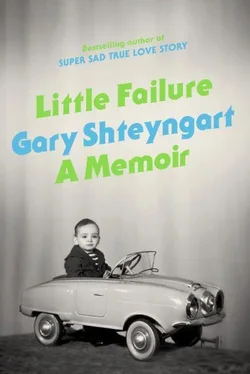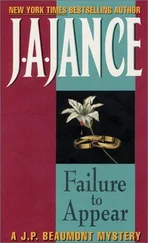Neither Mama nor Papa has told me that we are about to leave the Land of the Soviets for good. My parents are paranoid that I might blab it to some adult in power, and our exit visas will be canceled. No one has told me, but I know . And I have staged my own form of protest. I have brought on the worst asthma attack yet, a sputtering of helplessness so obscene that my parents consider not leaving .
Our apartment near Moscow Square has been sold to the son of a high-ranking party member. The party member’s son and his dad are very keen to see us haul our Jewish asses out and take possession of every square foot of our former property, not to mention our explosive Signal black-and-white television. They will also get the shabby Culture Couch on which I’ve slept and dreamed cultured dreams, tried to play the violin and the balalaika, and, with the help of my grandma Galya, written my masterpiece Lenin and His Magical Goose . Also included in the price of the apartment, the floor-to-ceiling wooden ladder my father built to try to help me conquer my fear of heights and to make me into an Athlete.
Son of a Party Member stops by with his high-ranking father, who happens to have a medical degree. “We don’t know what to do,” my mother tells the Communist Party duo. “The child has asthma. Maybe we should stay.”
Dr. Apparatchik, keen to get the apartment into his Communist son’s hands, says, “My medical opinion is that you should go. There will be better care for asthma in the West.”
Which is so very true.
My mother decides we should proceed with our flight. In response, my asthma gets worse. I will not let them take me . In the morning, I try the potty again, but nothing doing, the cabbage inside me knows our destination better than I do. It desperately wants to emigrate to the West, to end its life inside a gleaming Viennese toilet.

The last minutes on Tipanov Street are hazy. Do we sit down for a silent moment before the journey, as is the Russian custom? What’s the point? This journey will have no end.
Taxi to the airport. And there the truth of the matter is revealed to me: Aunt Tanya is here and my aunt Lyusya, who will die a decade later of cancer that would be operable almost anywhere else, and her daughter, my cousin Victoria, the ballerina whose hand I touched through glass during my quarantine, who begs my mother, “I want to come with you!” Everyone is here except my grandma Galya, who is bedridden. Nas provozhayut . We are being “sent off,” meaning this is not just a jaunt down to Crimea or Soviet Georgia. This is final. But where are we going?
Wailing before the customs line, the Jews are saying goodbye to their relatives with all the emotion they are well known for, saying goodbye forever. And there are so many Jews headed out on the Leningrad — East Berlin flight that the shores of Brooklyn and the tree-lined boulevards of Queens and the foggy valleys of San Francisco are already groaning in anticipation. Eyes still wet, all of us Snotties today, we are searched thoroughly by customs agents. A big man in full uniform takes off my fur hat and pokes around the lining, looking for diamonds we may have stashed illegally within. As a child I have never been mistreated by the system. In Russia, as in socialist China, there is a special grace accorded to children — in both countries there is usually only one little emperor per family. But I am no longer a Soviet citizen, and I am no longer worth according any special childhood privileges. I do not know it, but I am a traitor. And my parents are traitors. And if a good many people got their wish we would be dealt with as traitors.
The customs agent is plunging his thick fingers into my fur hat, and the asthmatic me is so scared he does not even have the wherewithal not not to breathe. And so I gulp down the thick ammonia-and-sweat-scented air of the small Stalin-era international terminal of dodgy Pulkovo Airport. My parents are nearby, but for the first time in my life I am alone without them, standing before authority. The customs agent finishes fondling my hat and puts it back on my head with a combination of a smile and a sneer. I am leaving Russia, but he will never leave. If only the child-me could have the compassion to understand that monumental fact.
Down the customs line, our luggage and the two gigantic army-green sacks have been thrown open for inspection. Feathers are flying out of our prized red comforter as the pages of my mother’s beige leather address book — the names and phone numbers of some relatives in Queens — are being torn out for no good reason by a sadist in uniform, as if we are spies smuggling information to the West. Which, in a sense, we are.
And then we are clear of the formalities, and clear also of our relatives. Writing today I can guess the word in my mother’s mind: tragediya . It is a tragic day for her. My father’s mother will soon join us in America, but my mother will not see her mother until 1987, right before her death, by which point Grandma Galya will be too far gone to even recognize her second daughter. Until the reformist Gorbachev takes over, traitors to the Soviet Union are not allowed to return to visit their dying parents. I suppose I am feeling her sadness, because I am, as my mother likes to say, chutkiy , or sensitive. But truth be told, I am not chutkiy enough. Because all I can see in front of us is the Aeroflot plane, the Tupolev-154. On one of his didactic trips around the Chesme Church, my father has told me that the Tupolev is the fastest civilian jet ever built, faster than the American Boeing 727! Certainly faster than the toy helicopter we are launching at the church spires along with our aeronautical cheers of “URA!”
And now we are inside this sleek, magical airplane, the one that can so decisively outfly our Cold War rival’s, and rumbling past the vast airfield, past the denuded winter trees in the distance, past the acres of snow deep enough to hide a thousand children. Forget asthma. I, myself, am holding my breath before the wonder of it. Sure, I am afraid of heights, but being inside the futuristic Tupolev, the fastest civilian jet ever built, is akin to being wrapped in my father’s arms.
No one has told me where we are going, but I have already prepared to be a fine representative of the Soviet race. On my breast, beneath the monumental overcoat and the monumental winter sweater, is a shirt sold only in the USSR and perhaps in the more discriminating shops of Pyongyang. It is a green wide-collared thing with blue and green vertical stripes and, between the stripes, a galaxy of yellow polka dots. The terminals of the shirt are tucked into a pair of black pants that reach up to my kidneys, ostensibly to keep them warm in transit. I have pinned this shirt with the symbol of the upcoming 1980 Moscow Olympics, a stylized Kremlin capped with a red star. The fluid lines of the Kremlin are reaching toward the star because my nation is always reaching toward excellence. Beneath the Olympic pin is situated the pin of a smiling tiger’s face. This is in mourning of Tigr , my stuffed tiger, who is too big to make the journey to wherever it is we are going.
Which is where again? Mama and Papa remain silent and worried throughout the flight. My mother scans the airplane’s badly sealed window for drafts. Drafts, according to Russian medical lore, are the great, silent killers.
We land with a proper thud somewhere and taxi to a terminal. I am looking out the window and yobtiki mat’ , fuck your mother, the sign — FLUGHAFEN BERLIN-SCHÖNEFELD — is not even in Russian anymore. Inside the terminal, past the officials in their green getups, an unfortunate, umlauted language is being spoken, my first understanding that the world is not powered entirely by the great and mighty Russian tongue.
Читать дальше













